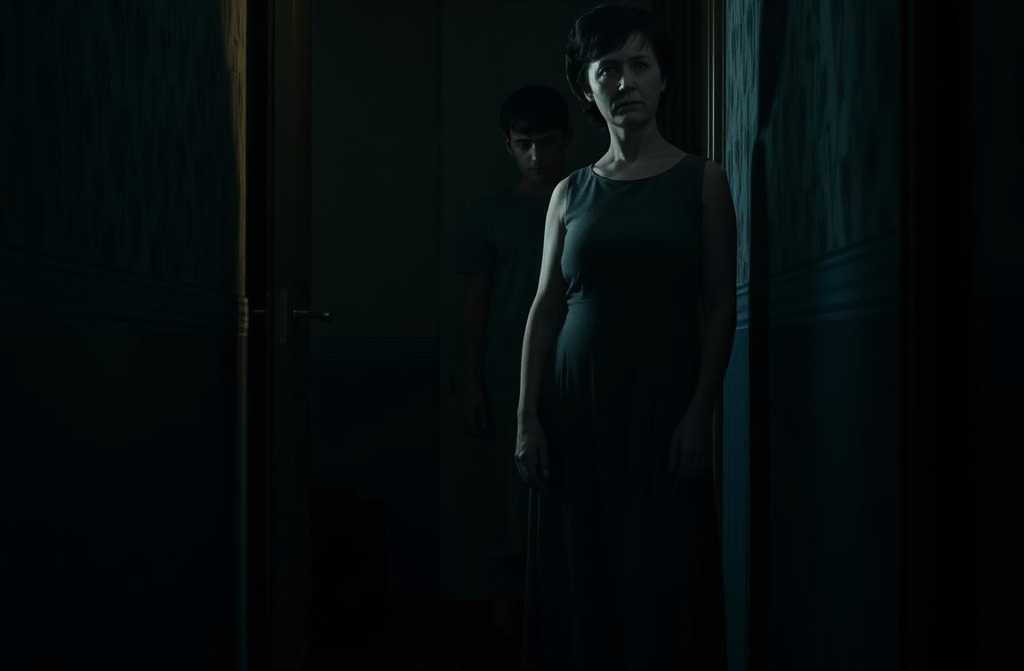Lucy was heavy. She had just turned thirty, and her weight had reached 120 kilograms. Maybe it was some illness, a bodily malfunction, or a metabolic disorder to blame. She lived in a forgotten, godforsaken little town. Traveling to see specialists in the city was too far and impossibly expensive.
There, in that town clinging to the edge of the map like a speck of dust, time didnt move by the clock but by the seasons. It froze in bitter winters, drowned in spring mud, gasped in summer heat, and wept with autumns piercing rains. And in this slow, dragging current, Lucyofficially Lydia but known to all as Lucydrowned in the monotony of her days.
Thirty years old, and her life felt hopelessly stuck in the bog of her own body. Those 120 kilograms werent just a numberthey were a fortress, a wall between her and the world. A fortress of exhaustion, loneliness, and quiet despair. She suspected the cause lay somewhere insidesome flaw, some diseasebut going to the city for doctors was unthinkable: too far, humiliatingly expensive, and likely pointless.
She worked as a nursery assistant at Little Bells, the local daycare. Her days were filled with the scent of baby powder, overcooked porridge, and perpetually damp floors. Her large, gentle hands could soothe a crying child, tuck in a dozen cots, or wipe up a spill without making the little one feel guilty. The children adored her, drawn to her softness and quiet kindness. But their fleeting affection was poor compensation for the emptiness waiting for her beyond the daycare gates.
She lived in an old, Soviet-era prefab, one of eight flats in a building that barely stood upright, its beams groaning at night and trembling in strong winds. Two years ago, her mothera quiet, worn-out woman who had buried all her dreams in these very wallshad passed away. Lucy barely remembered her father; he had vanished long ago, leaving behind only dust-covered memories and an old photograph.
Her life was harsh. Icy, rust-colored water trickled from the taps. The toilet stood outside, turning into an icy cave in winter, while summers turned the rooms into stifling ovens. But the worst tyrant was the stove. In winter, it devoured two truckloads of firewood, draining the last pennies from Lucys wages. Shed sit for hours staring into the cast-iron door, watching the flames, feeling as though they were consuming not just wood but her years, her strength, her futureleaving only cold ash behind.
Then one evening, as twilight filled the room with a leaden weight, something unexpected happened. Quiet, almost imperceptiblelike the shuffle of her neighbor Nancy in worn-out slippers. A knock came at the door, and there stood Nancy, clutching two crisp banknotes.
“Lucy, love, Im so sorry. Heres two hundred quid. I never forgot the debt, truly,” she muttered, pressing the money into Lucys hands.
Lucy stared at the cash, long having written off the debt.
“Honestly, Nancy, you neednt have worried.”
“But I *had* to!” Nancy insisted. “Because now Ive got money! Listen”
Lowering her voice as if sharing a dark secret, Nancy spun an unbelievable tale. Men from abroadAfghanshad arrived in town. One of them, spotting her with a broom, had offered a strange, almost eerie job: fifteen thousand pounds.
“Their citizenships on the line, see? So theyre hunting for brides in backwaters like ours. Fake ones. Yesterday, they married me off. God knows how they sorted the paperworkbribes, I expectbut it was quick. Mines called Rashid. Hes sitting in my place right now ‘keeping up appearances,’ but come nightfall, hell leave. My girl, Sophie, agreed too. She needs a winter coat. What about you? Look, this is a chance. You need money, dont you? And whod marry you otherwise?”
The last words held no malice, just brutal honesty. Lucy felt the familiar pang in her chest and hesitated only a moment. Nancy was right. A real marriage wasnt in her future. No suitors had come, and none ever would. Her life was the nursery, the shop, and this room with its ravenous stove. But fifteen thousand? That could buy firewood, fresh wallpaper to brighten the peeling walls
“Alright,” Lucy whispered. “Ill do it.”
The next day, Nancy brought the “candidate.” When Lucy opened the door, she gasped and stumbled back into the dim hallway.
Standing on the threshold was a young man. Tall, slender, his face untouched by lifes hardness, his eyes dark and unbearably sad.
“Good Lord, hes just a boy!” Lucy blurted.
The young man straightened. “Im twenty-two,” he said clearly, with only the faintest lilt to his voice.
“See?” Nancy chimed in. “Mines fifteen years younger! Yours is barely eight. A man in his prime!”
But at the registry office, they were refused. The clerk, in a stiff suit, eyed them suspiciously. “Theres a mandatory one-month waiting period,” she said coolly. “Time to reconsider.”
The Afghans left to work elsewhere, but before going, Rashidhis name was Rashidasked for Lucys number.
“Its lonely in a strange town,” he explained, and in his eyes, Lucy recognized a familiar achebewilderment.
He began calling. Every evening. At first, the conversations were short and awkward, then longer, more open. Rashid was an astonishing listener. He spoke of his mountains, of a sun unlike any here, of the mother he adored, and why hed come to Englandto support his family. He asked about her life, her work with the children, and to her surprise, Lucy found herself sharing. Not complaining, but recountingfunny stories from the nursery, descriptions of home, the scent of the first spring soil. She caught herself laughing into the receivergirlish, carefreeforgetting her age, her weight. In that month, they learned more about each other than some couples do in years.
Then the month ended, and Rashid returned. Lucy, squeezing into her only festive dresssilver, clinging tightfelt a strange tremor: not fear, but anticipation. His countrymen stood as witnesses, solemn and upright. The ceremony was brisk, bureaucratic, but to Lucy, it was a sparkthe glint of rings, official words, the surreal sense of stepping into another life.
Afterward, Rashid walked her home. Inside, he solemnly handed her the promised envelope of cash. Lucy took it, feeling its strange weightthe burden of her choice, her desperation, and yet, her new role. Then he pulled a small velvet box from his pocket. Inside lay a delicate gold chain.
“This is for you,” he said softly. “I wanted a ring, but I didnt know your size. I I dont want to leave. I want you to be my wife. Truly.”
Lucy froze, speechless.
“All month, Ive heard your soul through the phone,” he continued, his eyes burning with a grown mans certainty. “Its kind. Pure, like my mothers. Shes gone nowmy fathers second wife, but he loved her deeply. And Ive fallen in love with you, Lydia. Let me stay. With you.”
This wasnt a transaction. It was a proposal. And in his earnest, sorrowful gaze, Lucy saw not pity but something shed long stopped dreaming ofrespect, gratitude, and a tenderness kindling right before her eyes.
The next day, Rashid left againbut now, it wasnt goodbye, just waiting. He worked in the city with his countrymen but returned every weekend. And when Lucy discovered she was pregnant, Rashid sold his share in their business, bought a secondhand van, and came back for good. He started a transport serviceferrying people and goods to the nearest townand thrived through sheer hard work.
A son was born. Then, three years later, another. Two beautiful, dark-eyed boys with their fathers gaze and their mothers gentle nature. Their home filled with laughter, tiny footsteps, the warmth of a real family.
Her husband didnt drink or smokefaith forbade itwas tireless, and looked at Lucy with such devotion the neighbors grew envious. Those eight years between them melted away, forgotten.
But the greatest miracle was Lucy herself. She bloomed from within. Pregnancy, happiness, caring not just for herself but for a husband and childrenher body changed. The extra weight slipped away, day by day, as if it had only ever been a shell hiding something delicate and new. She didnt dietlife itself became motion, purpose, joy. She grew lovely, her eyes bright, her step light.
Sometimes, standing by the stove (now tended by Rashid), watching her sons play, shed catch her husbands warm, adoring gaze. And shed think of that strange evening, the two hundred pounds, Nancys visitand how the greatest miracles come not in thunder, but in a quiet knock at the







